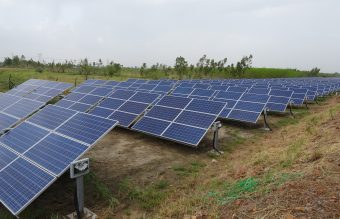
The first large-scale solar plant in North Macedonia ‒ financed with the support of the European Bank for Reconstruction and Development (EBRD) and bilateral donors to the Western Balkans Investment Framework (WBIF) ‒ has been connected to the power grid and is producing clean electricity.
The 10MW solar plant, built on the site of the spent Oslomej lignite coal mine, was constructed by JSC Elektrani na Severna Makedonija (ESM), the country’s state-owned electricity company. This is the company’s first solar plant in North Macedonia, developed with a view to diversifying energy sources and supporting decarbonisation. It is expected to produce nearly 15 GWh of electricity and displace 12,177 tonnes of CO2 annually.
The EBRD supported this investment with a EUR 5.9 million loan, while bilateral donors to the WBIF provided an additional EUR 1.6 million investment grant. The total project costs were EUR 8.7 million.
Andi Aranitasi, EBRD Head of North Macedonia, said: “The new solar plant will help the country, which faces severe air pollution from coal, to reduce its reliance on aging coal-fired infrastructure. It will also generate cheap electricity in times of very high market prices. We are proud of this achievement and are eager to continue our work with the authorities to promote further decarbonisation in North Macedonia.”
The new solar plant has a tenth of the capacity of the old coal-fired plant, so the EBRD is working with ESM on investing in additional solar power plants. The Bank also approved financing for an extension of the plant in Oslomej and the construction of a new plant in Bitola for a combined total capacity of 30MW. The European Union (EU) is also supporting this investment with a EUR 5.1 million investment grant.
More:
Julian Vassallo, Deputy Head of EU Delegation, said: “The transition of North Macedonia from a coal dependant country starts today, by making a step towards the implementation of the Green Agenda for the Western Balkans, in line with the European Green Deal. This first phase of investing in 10MW solar photo-voltaic in Oslomej is a pioneer investment in renewables. Using solar power to create clean energy brings tangible benefits to the lives of citizens by reducing air pollution, while strengthening the energy security of the country. “
In addition to providing financing, the Bank is working with the authorities of North Macedonia to address the implications for inequality of the energy transition and to identify opportunities for economic diversification in the area, including for redeployment and reskilling. The EBRD will help the country to conduct a “just transition” diagnostic and an inclusive policy dialogue. The “just transition” project is expected to have a significant demonstration effect for the wider Western Balkans region, which faces similar challenges and requires a green, inclusive and just energy-sector transition.
In addition to the bilateral donors to the WBIF, Italy supported the investment by financing the project’s technical feasibility assessment.
The Western Balkans Investment Framework (WBIF) supports socio-economic development and EU accession across the Western Balkans by providing finance and technical assistance for strategic investments. It is a joint initiative of the EU, financial institutions, bilateral donors and the governments of the Western Balkans. The largest individual cumulative pledges to date have been made by Norway, Sweden, Austria, Germany, Italy and the United Kingdom.
The Oslomej 1 photovoltaic power plant is one of the 21 flagship projects in the Western Balkan region, selected for EU financing in 2022 through the WBIF. The project has been identified as part of Flagship 4 – Renewable energy in the EU’s Economic and Investment Plan for the Western Balkans 2021-2027.
The EBRD is a major institutional investor in North Macedonia. To date, it has invested more than EUR 2.2 billion in 159 projects across the country. Supporting green energy is a priority for the Bank, as it addresses one of the country’s most pressing challenges.
Source: EBRD



